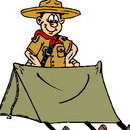Leaderboard
Popular Content
Showing content with the highest reputation on 02/13/20 in all areas
-
As a start...hire @Sentinel947 to pilot this at a district of his choice AND listen to his advice for growth to other districts. Perhaps establish coop relationships with colleges which offer outdoor related majors . Some juniors and seniors are over 20, though IMHO National should recognize 18yr olds as adults. Right next door to Summit,: https://admissions.wvutech.edu/academics/majors/adventure-recreation-management Maine: https://www.unity.edu/academics/certifications/recreation/ Minnesota: https://cehsp.d.umn.edu/departments-centers/center-environmental-educat4 points
-
Sounds right. So how do we get Scoutmasters to influence the Scouts towards exciting program? The answer used to be training, but the training materials seem less oriented towards adventure, less and less time is allocated to training, and little is done to encourage exciting program or to discourage unexciting program. E.g.: a weekend "lock-in" indoors to watch movies is a "weekend campout" for scoring Journey to Mediocrity," a principle tool, we are told, to promote "good program." 😍4 points
-
I stand by my point. Americans are getting out doors plenty. The people who are interested in getting out in nature and doing fun things are there. The average BSA Troop doesn't execute an exciting or compelling outdoor program most of the time. Some of that is the Guide to Safe Scouting, but I'd say more of it falls on the leaders of those troops. My Troop isn't all that special, but we do plenty of adventurous outdoor stuff: backpacking, canoeing, rock climbing, caving, shooting sports. All that stuff does cost money, and even the fairly well off families in my unit can't afford 8-12 expensi4 points
-
The 2019 Guide to Awards and insignia version (page 13) says: "when engaged in scouting activities, members may wear the neckerchief with appropriate nonuniform clothing to identify them as scouts". So, looks like the we will see more worn like those world jamboree photos.3 points
-
Agree some Scoutmasters need help with this. What if District had two or more experienced, enthusiastic, fit , young adult outdoor guides available to units at no cost? Maybe members of a local college outdoor club, former Philmont rangers and other super scouts, REI employees, graduates from college outdoor education programs, Maine Guides, ... Like a Council Philmont visit, they would visit a troop , talk about their adventures, answer questions, hope scouts and adults take hook....Ok lets start planning this trek...and help provide two deep leadership for weekend trek. My $03 points
-
I disagree with the top down approach to scouting. Anyone who takes a top down approach, I disagree with. Let's start at the beginning. A group of boys want to go camping. They belong to an organization. So, that organization charters a boy scout troop. Members of the Chartered Organization volunteer their time to the troop because they love and support the kids. This is good. Let's look at something else. A council employee gets evaluated based on the number of kids who sign up. His job depends on numbers. So, he pushes to charter new troops and new scouts. Many of the sco3 points
-
I lived in Europe for a while as a kid. When we (GSUSA scouts) wore our completely unofficiial, home-made, neckerchiefs with our ordinary clothing, we were immediately recognized as being some variety of Scout or Guide. (There were mulitple scouting/guiding organizations within what, to an American, is a fairly small geographical region.) When we wore our GSUSA uniforms we not nearly recognizable as scouts/guides. I much prefer the neckerchief to the "class b" shirt for being identifiable as scouts when out of uniform. It is readily recognizable from the distance. With a group2 points
-
I don't even think it has to be a paid role. This is something a great UC could do, but I'd never be a UC because I don't give a rip about chartering paperwork or JTE. Which is more of the job than helping troops grow fun outdoor programs.2 points
-
The idea is good, we had someone like this help our troop. Officially he was our UC. This kind of gets back to previous discussions of recruiting the right people for the right positions. Even getting "members of a local college outdoor club, former Philmont rangers and other super scouts, REI employees, graduates from college outdoor education programs, Maine Guides" requires somebody to first find them. The District Commissioner brought up in a District Committee meeting that he couldn't find any volunteers for Unit Commissioners. He wasn't even looking for qualified volunteers2 points
-
No! No! No! I was joking. The one time people agree with me here, and I was joking. Aaargh.2 points
-
Non-Scout people go outdoors to be active -- to hike, to hunt, to fish, to explore the landscape, to take photographs, to find and learn about the vegetation and the animals. All too often, Scouts go outdoors to be largely inactive in the open air (unless they have cabins or pavilions). They may do a hike or activity (geared to the younger Scouts) for a few hours during a weekend, but they spend a lot of time in their campsites working on advancement requirements, sitting by campfires, having Scoutmaster conferences (and even Boards of Review), laying in their tents or hammocks with their ph2 points
-
Just saw this article on changes in ceremonies regarding regalia. https://oa-bsa.org/article/oa-ceremonial-update1 point
-
Absolutely, the gear can be done on the cheap. I still have a Tyvek tent we made. But what about the other costs? $100 for unit dues, $400 for summer camp, $200 for weekend campouts, $200 for FOS (that is the "recommended" amount per scout in my council) and $60 to national. So, without gear or uniform or high adventure it's over $900/year. Oh, and parents that volunteer also get charged. Of those costs, the money used at the unit level are $300. If we did our own summer camp that would cut costs by about $150. If we skipped camporees and did our own that would save about $50. I'd rather1 point
-
That's no problem. We have 1 volunteer for every 3 scouts. Would you believe...1 volunteer for every 10 scouts? How about a retired Health teacher with a rusty pen knife?1 point
-
let me see, someone was complaining about not enough comments on this thread? I think this thread has mostly come down to there are needs for more volunteers. The bigger question for me is why does scouting require so many volunteers? We have 1000 scouts in our district and we have, I don't know, 2 dozen units with, say a dozen volunteers in each unit and the district needs another 60 people (but isn't close to that). So we need nearly 1 volunteer for every 3 scouts? That's crazy.1 point
-
Any off us who get that are showing our age. We were the first in my circle of family and friends to get a color tv in 1964, and the first thing my uncle wanted to know was what color car did Agent 86 drive.1 point
-
As Maxwell Smart would say, "Missed it by that much." 😄1 point
-
You just haven't seen a good one in action. But, I understand what you are saying. The expectations (or lack of expectations) of the UCs are set by the District Commissioner. My dream job after Scoutmastering was District Commissioner. But, that job was already taken, so I ended up doing other District and Council responsibilities. When the dream job was finally offered, I was burned out and declined. No regrets, but I don't think we would be stuck in today's political situation if I had taken the job because I had a plan for saving the world. 😎 Barry1 point
-
Unit Commissioners cannot escape getting entangled in all the administrative tasks, because they are the (only) folks who (theoretically) are in touch with every unit every month. So anytime there is paperwork to be collected from units or some council or district program to be promoted in units, "We'll have the UCs do it."1 point
-
I contacted a district commissioner about the possibility of a unit commisser for our troop -- and the answer was, basically, that they are lacking in volunteers. I'm thinking about talking with other local troops about whether they have any "retired" scouters would be happy to give some advice, based on their experience, to a new troop still figuring out how to get itself organized. If I find such a person, is it better to keep it as unofficial mentoring, or to suggest that this person consider signing on as a unit commissioner? (I understand that "new-unit commissioners" only need work1 point
-
The UC position is just another example of top down leadership. How can the council/district fix the units. You should to be looking for bottom up solutions. How can the units fix the council/districts? The current model doesn't allow for grassroots initiatives to improve council/districts. It's all top down thinking. That's why BSA will never improve.1 point
-
The effort is in the looking and asking around and just talking to folks to find people with skills, experience, and other resources. The skill is picking the right ones to recruit and getting them interested.1 point
-
1 point
-
Where do I sign up? But they can't be 18-20. BSA has decided those folks don't count as real adults.1 point
-
I'm curious what you see as the bigger goal of your patrol competitions. Interpatrol competition can be a fine thing as a means to an end --- maybe to foster a sense of camaraderie within the patrol, maybe as an incentive to up the skills of some individuals, maybe just as a way to showcase skills that have been mastered. But there are other ways to accomplish all those things. If the result of holding competitions turns out to be something negative rather than something positive then maybe rethinking ways to accomplish your goals is in order. Coincidentally, we have the mother of a fo1 point
-
Update 2/11/2020: Opportunities, Inc. Scouts with Disabilities Troops 6101 held the first Court of Honor at Opportunities, Inc. on Tuesday, February 11th in conjunction with the Caddo Area Council, BSA. The event recognized the achievements of the troops 20 members. Family was invited to attend, as well as prominent members in the scouting community who are affiliated with the troops. The members of Troops 6101 advanced in rank to “Scout,” the first rank in the Boy Scouts of America. The Scouts received their official Scout shirts and a framed Scout rank badge to commemorate the1 point
-
We no longer have districts. We have Service Areas run by Council employees with little Scouting background. Bankruptcy might be a good thing. "All hat and no cowboy."1 point
-
DE, or whatever the role is named going forward, should be 90% program focused. Their job should be to help facilitate the best program possible for units. That will help take care of membership issues. Let council development staff do the fundraising that is needed to support the council.1 point
-
After 20 years in the district having served many different committees, on train in Cubbing, Webelos, Webelos Outdoor, Scoutmaster Fundamentals and Venturing trained programs, (many of which I have gone on to lead), been unit leader in two different units, woodbadge trained (C9W-93), active outside of scouting, etc. etc. etc. and because I have never been "active" in the roundtables and chummed up to the others who vote, I won't ever receive the DAM award. Here it makes no difference what your "qualifications" are, it's who you know and who's your buddy. This past year, after being nominated1 point








